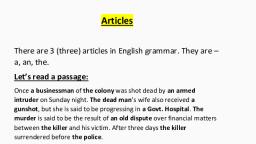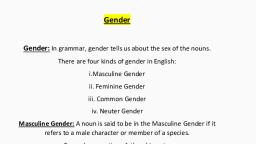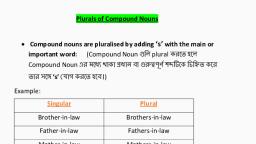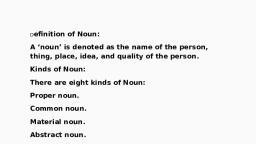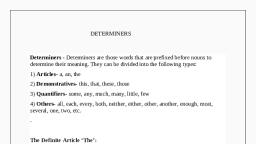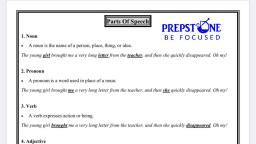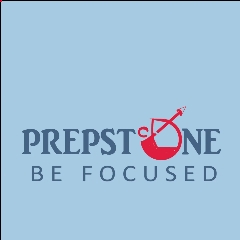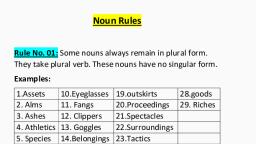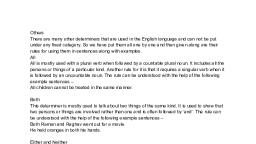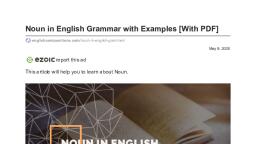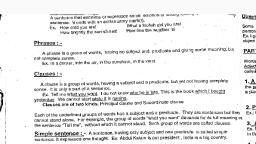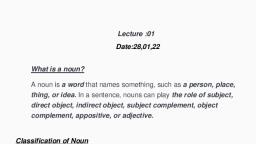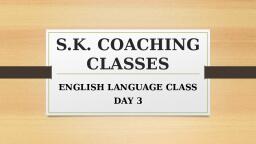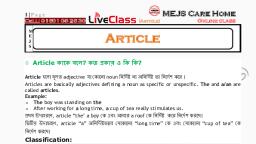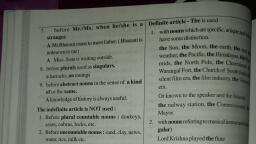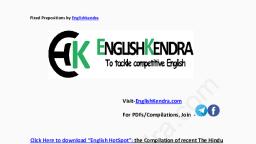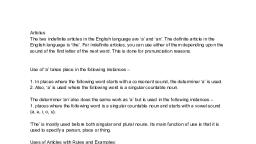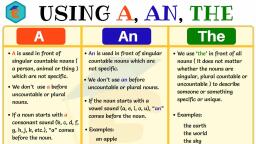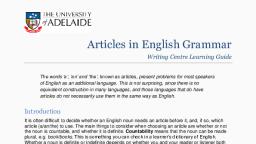Page 1 :
Parts of Speech, There are 8 (eight) types of Parts of Speech in English., 1.Noun, 5. Adverb, , 2. Pronoun, 3. Adjective, 4. Verb, 6. Preposition 7. Conjunction 8. Interjection., , 1. Noun: Noun is a word which names a person, animal, place,, and abstract idea., Example: i) I know Ram who gave you the book., 2. Pronoun: Pronouns are words which are used in place of, nouns., Example: i) PV Sindhu is a badminton player. She got, bronze at Tokyo Olympics., 3. Adjective: An adjective modifies a noun or a pronoun by, describing, identifying or quantifying it., Example: i) She is a good girl., ii) Iron is a heavy metal., 4. Verb: A verb is word used to express action or a state of, being or having something., Example: i) He stops the car., ii) They are hockey player., iii) We have a beautiful hut.
Page 2 :
5. Adverb: An adverb modifies the meaning of verb or, adjective or adverb., Example: i) He runs fast., ii) These are very sweet mangoes., iii) She speaks very loudly., 6. Preposition: A preposition is a word placed before a noun, or pronoun to show its relation to some other words in the, sentence., Example: i) The book is on the table., ii) She is in the garden., 7. Conjunction: A Conjunction is a word that joins words,, phrases, clauses or sentences., Example: i) He sat behind you, but in front of me., ii) We play football and cricket., 8. Interjection: An Interjection is a word which expresses, some sudden feeling or emotion., Example: i) Alas ! We lost Lata Mangeshkar, Sandhya, Mukhopadhyay and Bappi Lahiri within a week., 2. Hurrah ! Team India has won against West Indies.
Page 3 :
Noun and Its Kinds, Definition: Noun is a word which names a person, animal, place and, abstract idea., Example: i) I know Ram who gave you the book., , There are five kinds of noun in English:, a).Proper Noun b) Common Noun c) Material Noun, d)Collective Noun e) Abstract Noun, , 1 Jimmy is a faithful dog., 2. Kolkata is a big city., 3. The Ganga is a river., 4. The Taj Mahal is a monument., 5. Jasprit Bumrah is an Indian cricketer., 6. Mango is a seasonal fruit., • The naming words which are in bold letters in the above, sentences indicate a particular person, thing, animal, or place., Those nouns are proper nouns., • The underlined naming words in the above sentences are, referring to any person, place, thing or animal in a general way., Therefore, those underlined words are called common nouns., , 1.Proper Noun: Proper noun refers to the name of a particular person,, place or thing., Example: a) I live at Bishnupur.
Page 4 :
b) Akash is my friend., Note: A proper noun begins with a Capital letter and generally does not, take any article., , 2. Common Noun: A common noun is a name given in common to, every person or thing of the same class or type., Example: a) Akbar was an emperor., b) Phulmani is a girl., , 3. Material Noun: A Material Noun is the name of metal or substance,, of which things are made of., Example: a) The necklace is made of gold., b) The table is made of wood., c) The house is made of bricks, cement and sand., d) The window is made of glass., e) The iron of this pillar is good., , 4. Collective Noun: A collective noun represents a group of similar, persons, things or animals., Example: a) She plucked a bunch of flowers., b) A team of players is playing., c) In a nearby forest, a pack of wolves is howling., , 5. Abstract Noun: An abstract noun is a noun which names anything, which you cannot perceive through your five physical senses. It is, usually refers to the name of a quality, action or state.
Page 5 :
Example: a) Honesty is the best policy., b) The friendship between Ritisha and Ritama is pure., c) His bravery is known to everyone., d) He is meritorious since his childhood., , Read the following words given below:, Milk, apple, oxygen, book, egg, water, kindness, boy., , Q. Which things from the above list can you count?, Ans. We can count apple, book, egg, boy., Q. Which things of the above list cannot be counted?, Ans. Milk, Oxygen, water, kindness., , On the basis of counting, nouns are also classified into two groups., They are :a) Countable Noun b) Uncountable / Non Countable., , 1.Countable Noun: Some nouns can be counted. They can be, expressed in singular form and plural form. They are called Countable, nouns., Example: Boys, books, Note: Generally articles are used before Countable nouns., , 2. Uncountable Noun/Non Countable Noun: The nouns which cannot, be counted or cannot be expressed in number are Uncountable or, Non-Countable nouns. They usually do not have plural forms.
Page 6 :
Example: water, honey, petrol, cotton, salt., Note: Generally articles are not used before Uncountable nouns., • Sometimes Uncountable Nouns are used as Countable nouns., 1. To use an Uncountable Noun as a Countable Noun, we have to, place a Countable Noun before the Uncountable Noun., Example: a) Two bags of sugars., b) many packets of salt., , Countable Noun, , Uncountable Noun, , 1.Usually articles are used before, Countable nouns., Example: a boy, a flower, an, aeroplane., , 1.Usually articles are not used, before Uncountable nouns. But, to indicate a particular thing, we, can use ‘The’ before an, Uncountable Noun., Example: water, flour, milk., The water of the glass is cold., 2.’A little’ (অল্প কিছু টো / এিটু ) is, used before Uncountable nouns., Example: a little honey, a little, hope., 3.’Much’ ( অলেিটো / অলেি, পকিমোলে) is used before, Uncountable nouns., Example: Much rice, Much, money, much sugar., , 2.’A few’ ( অল্প কিছু গুল ো) is used, before Countable nouns., Example: a few students, a few, birds etc., 3.’Many’ (অলেিগুল ো / বহুসংখ্যি), is used before Countable nouns., Example: many players, many, women, many cows., , Prepared By,, Pappu Shaw, , Online Study











































